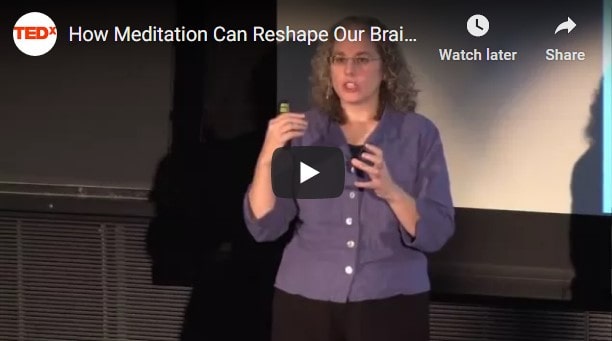
Table of Contents
Harvard neuroscientist Sara Lazar discovered the highly potent effects of meditation after she sustained an injury while training for the Boston Marathon.
Key Takeaways
- Mindfulness-based stress reduction (MBSR) and mindfulness meditation training enhance brain regions involved in emotional regulation, including the prefrontal cortex.
- Mindfulness practice leads to increased brain structure changes, improving stress responses and treating conditions like post-traumatic stress disorder.
- Eight weeks of mindfulness training can alter the default mode network and boost enhanced brain connectivity.
- Long-term meditation practitioners show greater resilience in the human cerebral cortex.
- Practices like mindfulness-based cognitive therapy strengthen connections within brain networks.
As she explains in her highly popular TEDx Talk video (which has been watched over 1.8 million times), her doctor told her that continuing to train would cause further injury. So, for the time being, she was directed to only continue stretching. Wanting a bit more fitness than that, Dr. Lazar opted for something in between a yoga class. One that incorporated meditation.
Although skeptical at first, she explains, she gradually started to notice that the class was making her calmer. She says she began to feel more compassionate and better able to handle difficult situations.
So, what had changed?
According to Dr. Lazar, it was her brain that was actually changing. In response to her new meditative practices, she was altering the connections within her brain, and through this repetition, she was improving her ability to handle stress.
Does Meditation Change the Brain?
Yes. Today, we know that meditation does change the brain, one of the benefits of meditation. This occurs through neuroplasticity.
What Is Neuroplasticity?
The concept of neuroplasticity, or brain plasticity, has been widely studied by medical researchers, doctors, and scientists. In essence, the concept refers to “the brain’s inherent capacity to adapt and remodel its architecture."
This is most important for our purposes when it comes to stress. Although an inherent part of life, stress affects many of us in negative ways. It clouds our ability to reason. It makes us short-tempered at work and with our loved ones. It keeps us from getting quality sleep at night. The list goes on and on. Chances are, you’ve had some run-ins with being over-stressed before — most of us have! The list of benefits of meditation can go on and on.
The light at the end of the tunnel, however, is that you can change how you react to stress, and not just at the conscious level. Your brain is plastic, which means it is “malleable” — changeable. Whether you want to improve your hand-eye coordination or react better to stress, you simply have to teach your brain what new “routes” you want it to take.
Here, repetition is key.
4 Ways Meditation Changes the Brain
Scientists know that meditation takes advantage of the brain’s plasticity through MRIs. Numerous studies have examined the brains of meditators vs. non-meditators and found the same thing time and again:
Those who meditate show more grey matter in areas that count.
What does meditation do? Essentially, this is positive because, “...grey matter gets its grey tone from a high concentration of neuronal cell bodies." You want a lot of cell bodies and synapses in areas of the brain that are used for desirable behaviors. Repetitive meditation practice helps to increase grey matter in areas that pertain to:
1. Attention
Meditation is inherently a practice that exercises the muscle of focus and attention. As such, studies have shown that with repetition, meditation can help the brain learn how to focus better and for longer on other tasks and topics as well.
2. Inflammatory Response
Many serious diseases are caused or exacerbated by inflammation. Several studies have found that
Mindfulness meditation training… is associated with improvements in a marker of inflammatory disease risk.
3. Learning and Memory
Memory and information comprehension and retention are also improved with consistent meditation practice. Meditators are better able to recall facts and memories and can recall them quicker than non-meditators.
4. Aging
In general, meditation helps build up grey matter in areas of the brain that have atrophied due to aging. These include all of the areas listed above and areas dealing with verbal fluency, processing speed, cognitive flexibility, creativity, and more.
How Meditation Changes the Brain: Frequently Asked Questions
How long does meditation take to change your brain?
After just one meditation session, you should notice positive benefits: A clearer mind, looser muscles, and a more relaxed and compassionate outlook. To actually achieve changes to your brain and increased grey matter in key areas, it may take a longer period of consistent meditation. For example, a key study looking at meditation’s effects on the brain put participants in MRI machines first as non-meditators and then later after having gone through an eight-week meditation program.
Can meditation change your personality?
Meditation will not change your personality by giving you a different fundamental character or making you unrecognizable to your friends and family members. However, it may provide you with a “tune-up” of some less-than-favored qualities. For example, it may make you more understanding, compassionate, calm, and centered.
How do I know if meditation is working?
There is no magic key to tell you that your “meditation practice is working.” Rather, you will begin to feel the small positive changes accumulate. Slowly, the benefits of meditation will amass and begin positively affecting your family life, work, and personal life.
Does meditation work?
The simple answer is YES! As shown above, it has several positive effects on the body. You simply need to set aside some time to allow yourself to experience meditation firsthand.
References
https://scholar.harvard.edu/sara_lazar/home
https://www.bbrfoundation.org/event/brain-plasticity-what-it-and-why-it-important
https://www.ncbi.nlm.nih.gov/books/NBK553239
https://www.pnas.org/content/108/50/20254.short
https://www.sciencedirect.com/science/article/abs/pii/S0006322316000792
https://www.frontiersin.org/articles/10.3389/fpsyg.2014.01551/full
Disclaimer
The contents of this article are provided for informational purposes only and are not intended to substitute for professional medical advice, diagnosis, or treatment. It is always recommended to consult with a qualified healthcare provider before making any health-related changes or if you have any questions or concerns about your health. Anahana is not liable for any errors, omissions, or consequences that may occur from using the information provided.
Beginning Meditation: Start Improving Your Brain Today
A journey of a thousand miles begins with a single step.
— Lao Tzu
Start changing the way your brain reacts to stress and anxiety as soon as today. With just one 25 minute Unwind Your Mind session, you’ll be on a path to reduced stress, decreased inflammation, a calmer attitude, and more peace in your life.
Why not start now? Your new life is waiting.

By: Clint Johnson
Clint is the driving force and founder of Anahana. Clint teaches Yoga, Pilates, mindful breathing, and meditation, catering to a global community of students and teachers.
